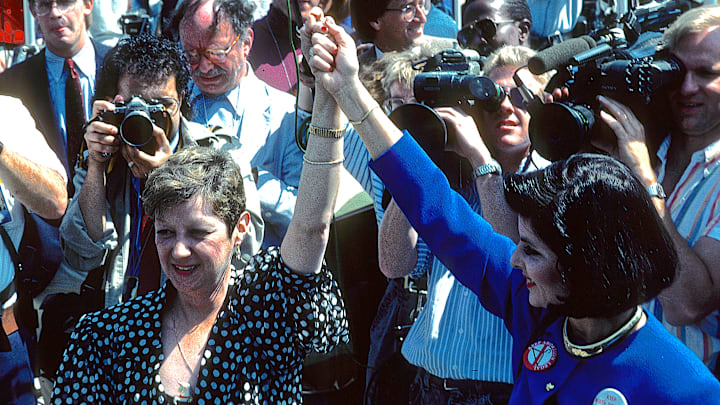To millions of Americans, she was Jane Roe. But to friends and family, she was just Norma.
The woman at the center of the 1973 Roe v. Wade case, which legalized abortion in America but was recently overturned in a 6-3 decision by the Supreme Court, described herself in her 1994 memoir as “a rough woman, born into pain and anger and raised mostly by myself.” Norma McCorvey was a struggling 22-year-old carnival worker when she became pregnant with her third child in 1970 and sought an abortion. She had already given birth to a daughter during an abusive marriage in her teens and another during a brief relationship a few years later, and gave both babies away—the first to her mother and the second to an adoptive family. This time, she wanted to end her pregnancy.
The laws in McCorvey’s native state of Texas only allowed abortion when the life of the mother was at risk, so she filed a lawsuit with attorneys Sarah Weddington and Linda Coffee, who were seeking a plaintiff to challenge the state's law. To protect her privacy, McCorvey was given the pseudonym “Jane Roe” in the filing against Henry Wade, the Dallas County district attorney. The case would take years to wind its way to the Supreme Court, offering little aid to its Jane Roe, who gave birth to a third baby girl and put her up for adoption. But when Roe v. Wade was finally heard in 1973, it offered newfound reproductive rights to child-bearing Americans.
McCorvey did not publicly reveal her identity until the 1980s, when she came out as a staunch defender of abortion. Yet in 1995, after decades of working in abortion clinics and living openly as a lesbian with her partner Connie Gonzalez, McCorvey stunned the world by declaring herself a born-again Christian committed to reversing Roe v. Wade.
“My goal now is to win other people over to Jesus and persuade some young women not to make the mistake of getting an abortion,” she told The Fort Worth Star-Telegram at the time. In the 2020 documentary AKA Jane Roe, however, McCorvey claimed that that very public change of heart was all an act, funded by evangelical anti-abortion groups.
“I took their money and they put me out in front of the cameras and told me what to say,” McCorvey says in the film. “I am a good actress.”
McCorvey died in 2017 at the age of 69 from heart failure. Remembered as the public face of both abortion rights in America and, paradoxically, the fight against them, she left an enormous mark on the nation’s political landscape—one that’s still at the fore a half-century later.
